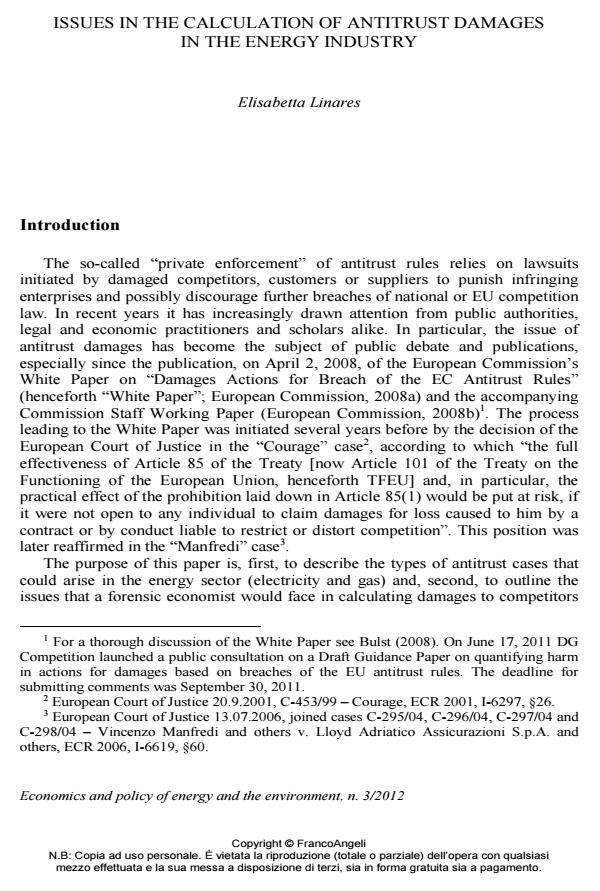Issues in the calculation of antitrust damages in the energy industry
Titolo Rivista ECONOMICS AND POLICY OF ENERGY AND THE ENVIRONMENT
Autori/Curatori Elisabetta Linares
Anno di pubblicazione 2012 Fascicolo 2012/3 Lingua Italiano
Numero pagine 20 P. 155-174 Dimensione file 655 KB
DOI 10.3280/EFE2012-003010
Il DOI è il codice a barre della proprietà intellettuale: per saperne di più
clicca qui
Qui sotto puoi vedere in anteprima la prima pagina di questo articolo.
Se questo articolo ti interessa, lo puoi acquistare (e scaricare in formato pdf) seguendo le facili indicazioni per acquistare il download credit. Acquista Download Credits per scaricare questo Articolo in formato PDF

FrancoAngeli è membro della Publishers International Linking Association, Inc (PILA)associazione indipendente e non profit per facilitare (attraverso i servizi tecnologici implementati da CrossRef.org) l’accesso degli studiosi ai contenuti digitali nelle pubblicazioni professionali e scientifiche
In recent years, the "private enforcement" of antitrust law, through the attempt by private parties (usually harmed competitors or consumers) to recover damages in court, has been increasingly gaining attention in Europe. This paper focuses on two particular regulated network industries (electricity and gas). The purpose of this essay is, first, to describe the types of antitrust cases that could arise in the energy industry and, second, to outline the issues that a forensic economist would face in calculating damages to competitors or other parties in these cases. The identified anti-competitive practices range from the delay or the outright denial of access to major gas transportation pipelines (or the refusal to expand their capacity), unfair tariffs for the use of gas transportation networks and capacity hoarding at regasification terminals or in other gas import infrastructure, to the delayed provision of reliable information needed for customer switching and/or to allow a new entrant to plan its electricity and gas purchases and thus minimize imbalance charges. These practices might entail actual monetary loss (damnum emergens) due, for instance, to; higher energy costs for final consumers; sunk costs incurred by competitors to start import or sales activities; noncost- reflective tariffs for access to gas import or transportation infrastructure; excessive imbalance charges and transmission fees; high costs sustained by traders to purchase electricity or gas for resale. Moreover, they may entail lost profits and foregone cash flows (lucrum cessans) due, for instance, to: definitive loss of customers; inability to serve or invoice energy consumers in a given period; lack of access to entire segments of the electricity or gas markets.;
Keywords:Energy, Electricity, Gas, Antitrust, Damages
Jel codes:L42, L49, L94, L95
Elisabetta Linares, Issues in the calculation of antitrust damages in the energy industry in "ECONOMICS AND POLICY OF ENERGY AND THE ENVIRONMENT" 3/2012, pp 155-174, DOI: 10.3280/EFE2012-003010